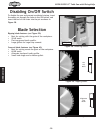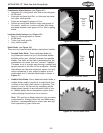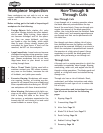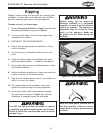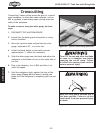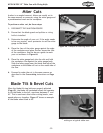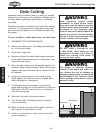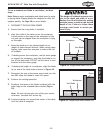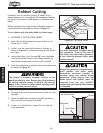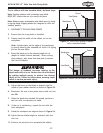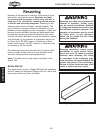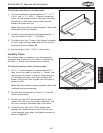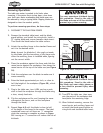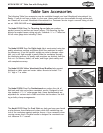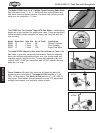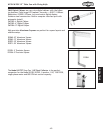
-36-
W1761/W1762 12" Table Saw with Riving Knife
OPERATIONS
Figure 51. Sacrificial fence.
Rabbet Cutting
You may experience kickback during
this procedure. Stand to the side of
the blade and wear safety glasses or
a face shield to prevent injury when
cutting rabbets.
Figure 52. Rabbet cutting.
Always use push sticks, featherboards,
push paddles and other safety
accessories whenever possible to
increase safety and control during
operations which require that the
blade guard and splitter must be
removed from the saw. ALWAYS
replace the blade guard after dadoing
is complete.
Commonly used in furniture joinery, a rabbet is an L-
shaped groove cut in the edge of the workpiece. Rabbets
can be cut with either a dado blade or a standard saw
blade.
Rabbet cutting on the edge of the workpiece requires a
sacrificial fence attachment as shown in Figure 51
.
To cut rabbets with the dado blade, do these steps:
1. DISCONNECT THE SAW FROM POWER!
2. Make the sacrificial fence the same length as the
fence and
3
⁄4" thick.
3. Attach it to the fence with screws or clamps as
shown in
Figure 51, making sure they are all secure
and tight.
4. Adjust the fence, turn the saw ON, raise the blade
into the sacrificial fence to the height needed for
the rabbeting operation, and turn the saw
OFF.
5. Align the workpiece to perform the cutting operation
as shown in
Figure 52.
The danger of kickback increases relative to the
depth and width of a cut.
Reduce the risk of kickback
by making multiple passes to achieve the desired
depth of cut
. Failure to follow these warnings could
result in serious personal injury.
6. Reconnect the saw to the power source and turn the
saw ON.
7. When the blade has reached full speed, perform a
test cut with a scrap piece of wood.
8. If the cut is satisfactory, repeat the cut with the
final workpiece.



